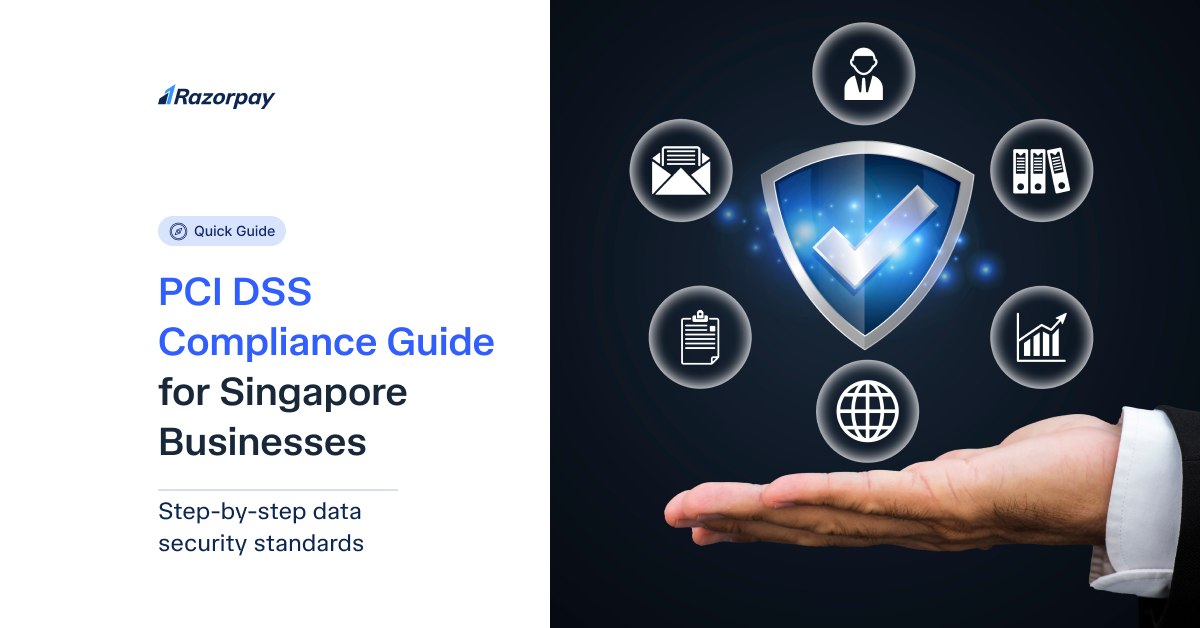For any business in Singapore that accepts credit or debit card payments, a crucial set of rules works silently in the background to protect every transaction. This is the Payment Card Industry Data Security Standard (PCI DSS). It’s not a government regulation, but a global security mandate that forms the bedrock of customer trust in digital commerce.
Understanding and adhering to PCI DSS is not optional—it’s a requirement for any merchant, big or small, who wants to accept card payments. For a business owner, the term can sound intimidating and complex. What exactly is it? What are you required to do? And what happens if you get it wrong?
This guide is designed to demystify PCI DSS for Singaporean businesses. We will break down what it is, what it requires, and most importantly, show you the simplest and most effective path to achieving compliance and securing your business.
Key Takeaways
- What It Is: PCI DSS is a mandatory set of security standards for any business that accepts, processes, stores, or transmits cardholder information.
- The Goal: Its single purpose is to reduce credit card fraud by ensuring that businesses handle sensitive card data in a secure environment.
- Compliance is a Must: All businesses, regardless of size, must be PCI compliant. Non-compliance can lead to severe penalties, including heavy fines and the loss of your ability to accept card payments.
- The Complexity is Real: The standard includes 12 core requirements that involve significant technical and operational effort to implement and maintain on your own.
- The Smart Solution for SMEs: Partnering with a PCI DSS-compliant payment platform like Razorpay Singapore is the most secure and efficient way to achieve compliance, as it shifts the security burden from your business to the provider.
What is PCI DSS? A Simple Definition for Business Owners
The Payment Card Industry Data Security Standard is a comprehensive set of rules and requirements created by the world’s major card schemes—Visa, Mastercard, American Express, Discover, and JCB. It was established to ensure that all companies that handle card data maintain a secure environment.
Think of it as the minimum security standard required to be part of the global digital payments ecosystem. Its core principle is simple: protect your customer’s card data.
The 12 Core Requirements: A Look at the Complexity
The PCI DSS framework is built around 12 main requirements, which demonstrate the depth of security needed for full compliance. For a business owner, understanding the scope of these rules highlights why a do-it-yourself approach is so challenging.
The 12 Requirements are grouped into six goals:
- Build and Maintain a Secure Network: This involves installing firewalls and ensuring all system passwords are strong and not left as vendor defaults.
- Protect Cardholder Data: This is a critical goal that requires protecting stored data and encrypting cardholder data when it’s transmitted across public networks (like the internet).
- Maintain a Vulnerability Management Program: This requires using and regularly updating anti-virus software and developing secure systems and applications.
- Implement Strong Access Control Measures: Access to sensitive card data must be restricted on a “need-to-know” basis, with unique IDs for every user.
- Regularly Monitor and Test Networks: All access to network resources and cardholder data must be tracked and monitored, and security systems must be tested regularly.
- Maintain an Information Security Policy: A formal security policy must be in place and shared with all relevant personnel.
The High Cost of Non-Compliance: Risks You Can’t Afford to Take
Failing to comply with PCI DSS can have severe and lasting consequences for a business.
- Heavy Financial Penalties: Card networks can levy significant fines for non-compliance, which are passed down through your acquiring bank. These can range from thousands to tens of thousands of dollars per month.
- Loss of Card Payment Privileges: In the event of a serious breach, your business could have its merchant account terminated, effectively cutting you off from accepting card payments.
- Reputational Damage: A data breach is a public relations disaster. The loss of customer trust can be far more damaging and long-lasting than any financial penalty.
- Forensic Audits and Legal Costs: After a breach, you may be required to fund a costly forensic investigation and could face legal action from affected customers.
Did You Know?
There are four levels of PCI DSS compliance, based on the number of transactions a business processes annually.
Most SMEs in Singapore fall into Level 4 (processing fewer than 20,000 e-commerce transactions per year). While this is the lowest level, the fundamental security requirements to protect cardholder data remain the same.
The Smart Path to Compliance: Partnering with a Secure Payment Platform
The golden rule of PCI DSS compliance for an SME is simple: never let sensitive cardholder data touch your servers. The moment you store, process, or transmit raw card numbers, you take on the full, complex burden of PCI DSS compliance.
This is why the most secure, efficient, and cost-effective solution is to partner with a payment platform that is already PCI DSS compliant.
A platform like Razorpay Singapore achieves this for you in two key ways:
- Secure, Hosted Checkout: We provide a secure payment page (via iFrame or a hosted page) where your customers enter their card details. This data is sent directly from the customer’s browser to our secure, compliant servers, completely bypassing your own systems.
- Tokenization: For any subsequent processing, like recurring billing or “saved cards,” we use tokenization. This technology replaces the sensitive 16-digit card number with a unique, non-sensitive “token.” Your system stores the safe token, while we protect the actual data in our PCI-compliant vault.
By using this approach, you drastically reduce your PCI DSS scope because you are no longer handling the sensitive data yourself.
Ready to Simplify Security and Achieve Compliance?
Don’t let the complexity of PCI DSS put your business at risk. Choose a partner that handles the heavy lifting for you.
Learn how Razorpay Singapore’s PCI-compliant platform secures your payments.
Conclusion
PCI DSS compliance is a non-negotiable part of doing business in the digital age. It is the framework that makes secure e-commerce possible and maintains the trust that the entire ecosystem relies on. While the requirements are rigorous, the path to compliance for a Singaporean SME is straightforward: partner with a fully compliant payment platform. This allows you to offload the immense security burden and focus on what you do best—growing your business.
Frequently Asked Questions (FAQs) for Singapore Merchants
Is an SSL certificate enough for PCI compliance?
No. An SSL certificate is a required first step—it encrypts data as it travels between a customer’s browser and your website. However, PCI DSS is a far more comprehensive standard that governs what you do with that data after it arrives, including how it’s processed, stored, and protected.
How do I prove to my bank that I am PCI compliant?
When you partner with a Level 1 compliant provider, you are leveraging their compliance. They can provide an Attestation of Compliance (AOC), which is a formal document from an external auditor that certifies their compliance. For most SMEs, this, along with completing a simple Self-Assessment Questionnaire (SAQ), is sufficient proof for your banking partners.
What is the difference between the four levels of PCI compliance?
The four levels are based on annual transaction volume. Level 1 is for merchants processing over 6 million card transactions annually and requires a rigorous external audit. Levels 2, 3, and 4 have lower volume thresholds and typically allow for a Self-Assessment Questionnaire (SAQ). However, the core security standards apply to all levels.
Does PCI DSS apply to PayNow transactions?
No. PCI DSS specifically applies to the handling of payment card data (from networks like Visa, Mastercard, etc.). PayNow is a direct bank-to-bank transfer system and does not involve card numbers, so it falls outside the scope of PCI DSS.




